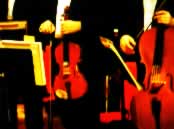maximinozumalave.com / REPERTOIRE


maximinozumalave.com / repertorio
I consider that it is indeed a great fortune to be able to dedicate almost all my time to learn and share the wonders many great composers have bequeathed to us. I revel in that splendid sensation, to be able to transmit to the public what the music transmits to me.
Each movement of the baton draws in the air a simple question: My friends, does this sound to you as beautiful as it sounds to me?; and another one: does it move you as much as it moves me?
It is certainly a great privilege to bring alive the music of other times in our time, and also those new works that I hope will become timeless in the future. There is always a tension that turns the classic into contemporary, and which, when it takes place, also elevates the contemporary to the category of classic; for that reason I defend the music of Bach, Mozart, Mahler or Ravel... and I like to contribute to assuring their works never sound the same. Like Heraclitus' river, the tireless, ever-running waters of the river of music are always different, although their channel is always the same one: thus, the interpreter collaborates to make music a compendium of life, and even to make listeners forget, if only during a brief whisper of time, the problems of their everyday lives.
But, apart from escapism, there is the unavoidable fact that all artistic experience can stimulate our psychic and intellectual faculties and enhance the experience of living our human condition facing and solving our individual and social problems. What Music is (and its power) was beautifully exposed by Goethe when saying that J. S. Bach's Well Tempered Klavier could very well summarise what God must have felt immediately before the creation of the world.
A contemporary interpreter must have an ample repertoire. For several centuries we have been amassing masterpieces in what now constitutes a rich a varied tradition. Furthermore, we continue to increase it with new compositions, with the music of our times - although it might be befitting to question what exactly is the music of my times...?
This repertoire, painstakingly harvested for centuries, generation after generation, is also frequently increased by the search for (and, sometimes, the discovery of) hitherto hidden jewels: we might imagine what it was like for Mendelssohn to discover Bach…
Often the interpreter dedicates more time to the study of a work than the composer to its creation. I consider a fascinating challenge that in successive interpretations the work always continues maturing, instead of ageing.
It seems logical to think that two conductors with different personalities and thoughts, with diverse emotions and personal values, might understand in different ways the same notes from a score.
Does this not happen when two actors recite the same text? They have different voices, forte is of different sonorous level, the speed whereupon they declaim, the internal rate, the duration of the pauses, the points of greater emphasis, neither are equal, nor would they ever be. Neither the copyists of Velazquez's paintings in the Prado Museum, nor those impressionists that parody politicians on television, will ever manage to perfect the original on which their copies are based. Because perfection will never spring from the hand of an imitator.
Where is, then, authenticity, fidelity...? More than fidelity to the letter, we should have to speak of the degree of fidelity whereupon the interpreter reproduces what he believes where the artistic intentions of the composer.
Fidelity to the work, but also to the composer, since composers can use different means of artistic expression throughout their lives. We must speak, then, of the style of each given work, and not of each composer. The interpreter must be faithful to the style.
The limits are not, alas, always clear cut. Let us think about Mozart and Beethoven. It is always fascinating to discover similarities, what there is of Bach in Mozart, of Mozart in Beethoven, Beethoven in Brahms, etc. There we have an example of how music goes beyond the frontiers of time.
When confronting a written work we cannot be arbitrary. A great amount of preparation and study of that work must take us to the point in which the accomplishment of the most minute detail in the score is a musical necessity for us, the interpreters. That preparation has to take us to such and intimate relation with the piece that we get to feel it like a part of ourselves.
The detail and the piece as a complete entity are intimately united. To consider each isolated detail as a whole might contribute to produce a disembodied, perhaps arbitrary interpretation without any coherent relation with the whole work, which would make of the detail an "effect without cause". On the contrary, to find the nexus between the entire piece and its details, will allow us to find out precisely the cause of each effect.

